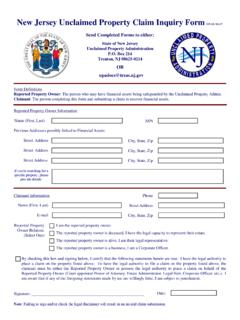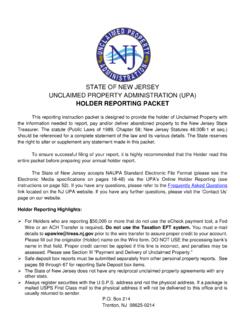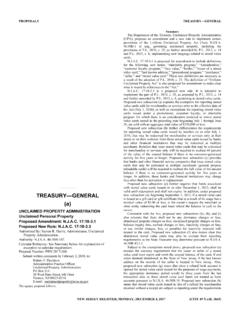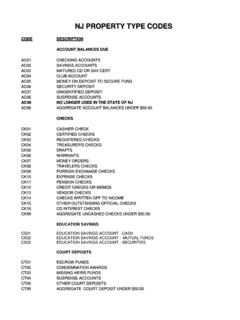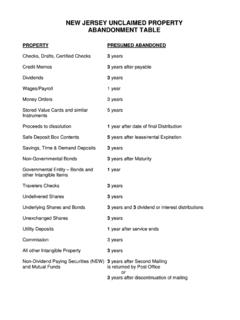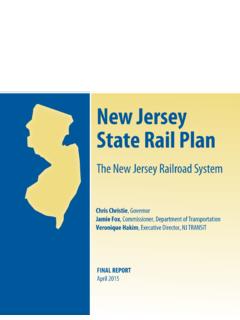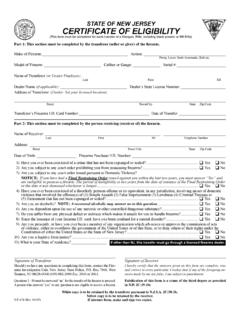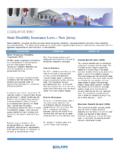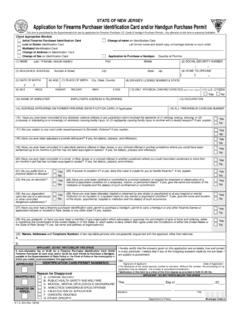Transcription of STATE OF NEW JERSEY
1 ASSEMBLY BUDGET COMMITTEE STATEMENT TO ASSEMBLY, No. 3002 STATE OF NEW JERSEY DATED: JUNE 24, 2010 The Assembly Budget Committee reports favorably Assembly Bill No. 3002. The bill modifies the STATE s unclaimed property laws to adjust the time periods for presumptions of abandonment, limit issuer imposed dormancy fees, and provide for related administration of certain unclaimed property. The primary purposes of this measure are to protect New JERSEY consumers from certain commercial dormancy fee practices and modernize the STATE s unclaimed property laws. The bill provides the following presumptions of abandonment: Adjusts the period of time which triggers abandonment for travelers checks from 15 to 3 years; Adjusts the period of time which triggers abandonment for money orders from 7 to 3 years; and Creates a 2 year trigger for abandonment of stored value cards. The bill s definition of stored value cards, includes, but is not limited to, paper gift certificates, gift cards and rebate cards.
2 The bill also limits the imposition of dormancy fees as follows: Precludes the imposition of dormancy fees on travelers checks or money orders in the first 12 months after issuance and limits permissible dormancy fees to $2 per month; and Precludes the imposition of dormancy fees on stored value cards, credit balances, overpayments, security deposits, unused tickets, refunds, credit memoranda and similar instruments. The bill also includes stored value cards into an existing reimbursement process for escheated properties so that if an escheated stored value card is subsequently claimed by an owner and honored by the issuer, the STATE can reimburse the issuer. Additionally, the bill requires stored value card issuers to obtain the name and address of purchasers and to maintain, at a minimum, a record of the zip code of the purchaser. In instances where an issuer does not have the name and address of a purchaser, the address of the purchaser shall assume the address of the place where the stored value card is purchased, if that place is located in New JERSEY .
3 These provisions are designed to modernize the STATE s unclaimed property processes relative to other states and enhance New JERSEY s capacity to 2 protect its residents stored value cards from being subject to other STATE s escheatment processes. Stored value cards issued under a promotional program, customer loyalty program, charitable program or by a business selling $250,000 or less of stored value cards in the prior year are exempted from the stored value card provisions of the bill. The bill also authorizes the STATE Treasurer to grant an exemption from such provisions concerning stored value cards, on such terms and conditions as the STATE Treasurer may require, for a business or class of businesses that demonstrate good cause. In determining whether to exercise the discretion to grant an exemption, the STATE Treasurer may consider relevant factors including, but not limited to, the amount of stored value card transactions processed, the technology in place, whether or not stored value cards issued contain a microprocessor chip, magnetic strip, or other means designed to trace and capture information about place and date of purchase, and such other factors as the STATE Treasurer shall deem relevant.
4 The bill specifies that only stored value cards exempted from the unclaimed property provisions of the bill shall be deemed gift cards or gift certificates subject to the consumer protections provided under , ( :8-110). The bill takes effect July 1, 2010 and applies to stored value cards, travelers checks, money orders and certain similar instruments outstanding on and after July 1, 2010, including, but not limited to, those issued before July 1, 2010. FISCAL IMPACT: In the FY 2010-2011 Budget in Brief, the Executive projects that this proposal, prior to revision, would have increased STATE General Fund revenues by $79,580,000 in FY 2011. The OLS can neither concur nor disagree with this estimate, given that the Executive has not elaborated on the method and data underlying its projection and that a lack of data precludes the OLS from ascertaining its accuracy.
5 The OLS agrees, however, that the bill will produce an annual revenue gain to the STATE General Fund. The office also points out that the FY 2011 revenue increase will be noticeably larger than the gain in subsequent years because of significant one-time collections that will occur in FY 2011 as a consequence of the naturally front-loaded mechanics of accelerating and establishing abandonment periods. The OLS also notes that the legislation might cause the New JERSEY Department of the Treasury to incur additional administrative expenses since the unclaimed property program will be extended to a new asset type, stored value cards. (Sponsorship Updated As Of: 6/29/2010) ASSEMBLY, No. 3002 STATE OF NEW JERSEY 214th LEGISLATURE INTRODUCED JUNE 24, 2010 Sponsored by: Assemblyman DECLAN J. O'SCANLON, JR. District 12 (Mercer and Monmouth) Assemblywoman AMY H. HANDLIN District 13 (Middlesex and Monmouth) Co-Sponsored by: Senator SYNOPSIS Adjusts time periods for presumptions of abandonment, limits issuer imposed dormancy fees, and provides for related administration for certain unclaimed property.
6 CURRENT VERSION OF TEXT As introduced. A3002 O'SCANLON, HANDLIN 2 EXPLANATION Matter enclosed in bold-faced brackets [thus] in the above bill is not enacted and is intended to be omitted in the law. Matter underlined thus is new matter. AN ACT concerning presumptions of abandonment, issuer imposed 1 dormancy fees and related administration of certain unclaimed 2 properties, amending and supplementing chapter 30B of Title 46 3 of the Revised Statutes and repealing parts of the statutory law. 4 5 BE IT ENACTED by the Senate and General Assembly of the STATE 6 of New JERSEY : 7 8 1. :30B-6 is amended to read as follows: 9 46:30B-6. Definitions. 10 As used in this chapter: 11 a. "Administrator" means the Treasurer of the STATE of New 12 JERSEY , any individual serving as the Acting Treasurer in the 13 absence of the appointed Treasurer, and any STATE employee to 14 whom the Treasurer has delegated authority to administer the 15 provisions of this chapter and to execute any pertinent documents; 16 b.
7 "Apparent owner" means the person whose name appears on 17 the records of the holder as the person entitled to property held, 18 issued, or owing by the holder; 19 c. (Deleted by amendment, , ). 20 d. "Business association" means a corporation, joint stock 21 company, investment company, business trust, partnership, 22 unincorporated association, joint venture, limited liability company, 23 safe deposit company, safekeeping depository, financial 24 organization, insurance company, mutual fund, utility or other 25 business entity consisting of one or more persons, whether or not 26 for profit; 27 e. "Domicile" means the STATE of incorporation of a corporation 28 and the STATE of the principal place of business of an unincorporated 29 person; 30 f. "Financial organization" means a savings and loan 31 association, building and loan association, credit union, savings 32 bank, industrial bank, bank, banking organization, trust company, 33 safe deposit company, private banker, or any organization defined 34 by other law as a bank or banking organization; 35 g.
8 "Holder" means a person, wherever organized or domiciled, 36 who is the original obligor indebted to another on an obligation; 37 h. "Insurance company" means an association, corporation, 38 fraternal or mutual benefit organization, whether or not for profit, 39 which is engaged in providing insurance coverage, including 40 accident, burial, casualty, credit life, contract performance, dental, 41 fidelity, fire, health, hospitalization, illness, life (including 42 endowments and annuit ies), malpractice, marine, mortgage, surety, 43 and wage protection insurance; 44 i. (Deleted by amendment, , ). 45 A3002 O'SCANLON, HANDLIN 3 j. (Deleted by amendment, , ). 1 k. "Owner" means a person having a legal or equitable interest 2 in property subject to this chapter or the person's legal 3 representative and includes, but is not limited to, a depositor in the 4 case of a deposit, a beneficiary in the case of a trust other than a 5 deposit in trust, and a creditor, claimant, or payee in the case of 6 other property; 7 l.
9 "Person" means an individual, business association, STATE or 8 other government, governmental subdivision or agency, public 9 corporation, public authority, estate, trust, two or more persons 10 having a joint or common interest, or any other legal or commercial 11 entity; 12 m. " STATE " means any STATE in the United states , district, 13 commonwealth, territory, insular possession, or any other area 14 subject to the jurisdiction of the United states ; 15 n. "Utility" means a person who owns or operates for public 16 use any plant, equipment, property, franchise, or license for the 17 transmission of communications or the production, storage, 18 transmission, sale, delivery, or furnishing of electricity, water, 19 steam, or gas; 20 o. "Mineral" means gas, oil, coal, other gaseous, liquid and 21 solid hydrocarbons, oil shale, cement material, sand and gravel, 22 road material, building stone, chemical raw material, gemstone, 23 fissionable and nonfissionable ores, colloidal and other clay, steam 24 and other geothermal resources, or any other substance defined as a 25 mineral by the law of this STATE ; 26 p.
10 "Mineral proceeds" means amounts payable for the 27 extraction, production, or sale of minerals, or, upon the 28 abandonment of those payments, all payments that become payable 29 thereafter, and includes, but is not limited to, amounts payable: 30 for the acquisition and retention of a mineral lease, including 31 bonuses, royalt ies, compensatory royalt ies, shut-in royalt ies, 32 minimum royalt ies, and delay rentals; 33 for the extraction, production, or sale of minerals, including net 34 revenue interests, royalties, overriding royalties, extraction 35 payments, and production payments; and 36 under an agreement of option, including a joint operating 37 agreement, pooling agreement, and farm-out agreement; 38 q. "Money order" means an express money order and a 39 personal money order, on which the remitter is the purchaser; 40 r.
